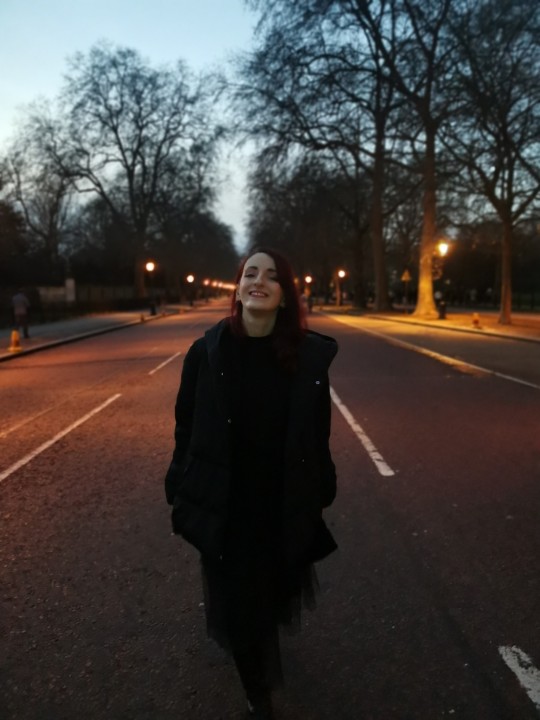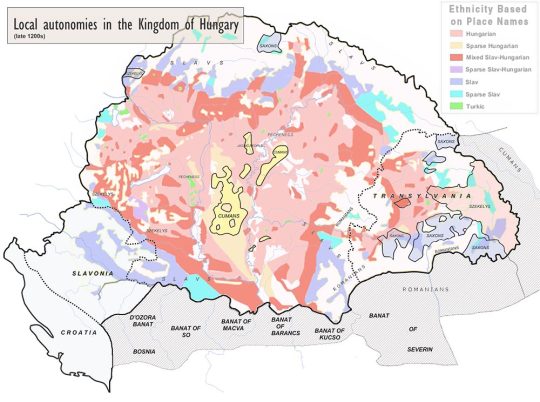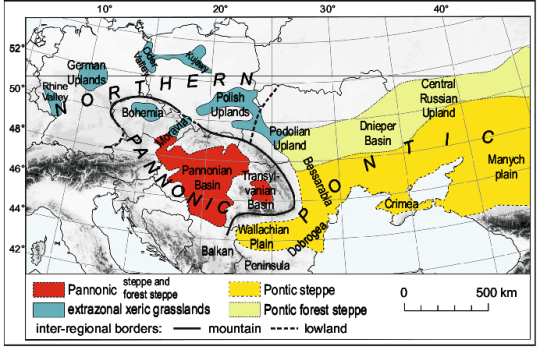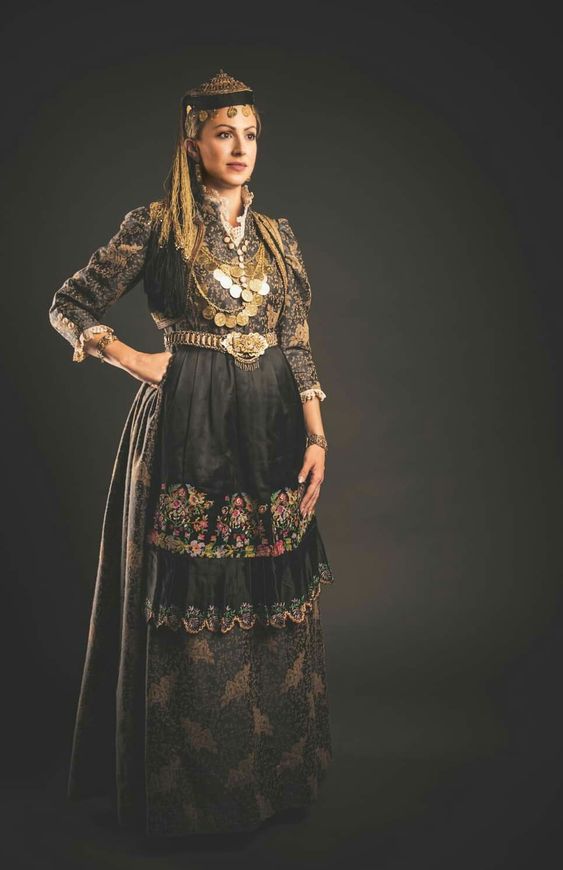#Vlach
Explore tagged Tumblr posts
Text












AeternaNova Northern Macedonian ethnographic project
"AeternaNova" (in Latin "aeterna"- ancient and "nova"-new) is an exhibition of photographs, folk costumes, and an ethnographic film, curated by Filip Petkovski Ph.D., UNESCO-certified heritage expert. It aims to represent the cultural heritage of Macedonians, Albanians, Turks, Roma, and Vlachs living in North Macedonia, and to feature recorded personal narratives of the models on the photos who are leaders in their professions (actors, musicians, athletes, public figures), about their views and experiences with diversity and inclusion.
The project incorporates new media, ethnography, and visual anthropology to contextualise the topic, while each photograph serves as a visual narrative aimed to illustrate the dynamic evolution of cultural identity in the region. We are led by the idea that cultural heritage must be reinterpreted and modernised to be largely disseminated, especially amongst the younger population, who might mystify and reject the topic of cultural heritage. The exhibition will take place at the Youth Cultural Centre in Skopje, while the results of the project will be published as a research paper in the journal "Macedonian Folklore" in which we will explore diversity, inclusion, and peaceful coexistence.
The project aims to emphasise the similarities in the cultures of all of the communities that live in North Macedonia and encourages the audience to engage in a process of mutual learning and enrichment of knowledge related to cultural heritage."
#folklore#ethnographic#slavic#folk costumes#slav#macedonian#macedonia#northern macedonia#vlach#albanian#turkic#yoruk#roma#macedonians#northern macedonians#balkan
398 notes
·
View notes
Text

From an AU I've been getting into with @kikatzu where Vlach and Ludwig join up with/get corrupted by the Unitologists and are worshipped like deities by them
#Oh my God they were villainssss#Dead Space#Necromorph#Unitology#Leaper#Stalker#Vlach#Ludwig#Fan characters#Art#Doodles#Evil AU
59 notes
·
View notes
Text

Background for the idea of the drawing:
I was reading this paper this winter and it seems to give further evidence that the highest percent of genetic heritage in modern Bulgarians can be (conditionally) attributed to medieval Slavs, while the rest would ought to be distributed between other groups (such as Bulgars, local population, later migrations, etc). And at one point I had the image in my head of a medieval Slavic toothless peasant girl having to choose between a flea-ridden Vlach shepherd boy and a bow-legged Bulgar horseman. I thought it would be funny if this was represented in this kind of YA-style novel/film of a young woman being in a love triangle during a military conflict (which the Middle ages abound with).
So I thought of this story that takes place in the 9th c. where a young girl whose village was raided by the Byzantines led her to want to join the Bulgarian army. She met resistance from the chiefs, however, there was a compromise - she was still allowed to help out with logistics, cooking and distributing resources among the soldiers, etc. One warrior though believed in her ability to learn to fight and trained her at night, when the others were sleeping, which led to them becoming close friends. Meanwhile she would regularly buy provisions for the army from a local shepherd boy and they also seemed to develop a liking to each other. Political conflict escalates and leads to the battle of Pliska between khan Krum and emperor Nicephorus I, where on the side of the Bulgarians women join the fight. Our girl tastes blood for the first time and it changes her forever..
Things from here on become a little different and I'll keep the rest of the story to myself in case I ever turn this into something, but it's meant to make fun of itself to some extent. I made the drawing in the style of YA poster films and the Menologion of Basil II. The main character was based on the personification of Sclavinia in the gospels of Otto III. Except for the Bulgar boy and the girl's temple ring, the clothes and hairstyles are speculation based on later ethnographic data.
28 notes
·
View notes
Note
Hi Theitsa :) What does it mean when Greeks call eachother "vlach" or "vlachos"? It seems sort of negatively charged, is it derogatory? I know that Vlach people are an ethnic group, is it related to them?
I had another ask today about this, so it's also time to answer this older ask! Yes, if one says it as an accusation or with a negative tone, it's a derogatory term, basically meaning "hillbilly". Vlachs (the Latin group) have been living in Greece for a thousand years and they shaped their own local identity. It's getting more and more Hellenised as older generations don't teach their dialect and ways to others. (It happens with many Greek tribes, sadly)
For some reason, others have observed some ways of the Vlachs which, in their eyes, marked them as rural and unrefined. It could be that urban Athenians or Thessalonians came frequent in contact with rural Vlachs and so the stereotype "villager = Vlach " stuck for a large part of the population.
I don't support this stereotype as I've seen all Greek tribes being "hillbillies" in their own way, and we should all embrace what we are, and stop being snobbish, and just have some faith in our authentic selves as Greeks for once😉
#if someone has more knowledge of how the stereotype came to be you're welcome to write it here#answered#vlach
12 notes
·
View notes
Text








Here.. Looking for balance.. ⚖️🎶✨
#london based#balance#multilingual#indie music#indie folk#experimental music#Ισορροπία#greek songs#bandcamp#spotify#apple music#Human art#mandala#semedaki#vlach#polyphonic#Spotify
37 notes
·
View notes
Text

Nomadic Vlachs on a Voyage, Thessaly, 1897, photos of Burton Holmes
7 notes
·
View notes
Text
Ethnic Composition of Medieval Hungary


Before the arrival of the Magyars, the Pannonian Basin was inhabited by many different peoples. Among them were various nomadic societies like the Avars, Bulgars, and Huns. Sedentary societies such as the Slavs, Vlachs, and Germanic peoples also co-existed, sometimes tumultuously, alongside their steppe neighbors.
In the 9th century AD, the Magyars invaded the Pannonian Basin and established themselves as its rulers. It is important to note that the early Hungarians were not a distinct ethnic group, but rather a military alliance comprising multiple Uralic, Iranian, and Turkic tribes. By the 11th century AD, the Magyars had adopted a sedentary way of life and embraced Latin Christianity. Over time, the diverse inhabitants of the Pannonian Basin began to intermingle, eventually forming an ethnic group that is now recognized as the Hungarian nation.
Sources of the images are specified below each respective picture.
#migration#magyar#hungarian#european#steppe nomad#Carpathian basin#pannonian basin#pannonia#slavs#german#vlach#anthropology#history
2 notes
·
View notes
Text

1 note
·
View note
Text
I'm never going to get over my third great grandpa; like imagine being born a vlach serf in 1830s feudal Moravia and then dying in 1890s Texas. What a life goddamn!
0 notes
Text
Cultural and Ethnic groups of Greece by c.minoa
#greece#greek history#greek people#minorities#vlachs#ablanian#turkish#aromanian#jewish#afrogreek#anatolian#rum#arab#romani#bulgarian#armenian#sarakatsan#arvanites#pomak#history#culture#mediterranean#balkans
105 notes
·
View notes
Photo

Emmanuelle (Just Jaeckin, 1974) Czech movie poster by Zdenek Vlach
61 notes
·
View notes
Text
just a casual saturday night i am about to start working on something, i got my bitter hot cocoa with cinnamon and i’ve been thinking about all the creative art works i made for my ex bff like. I literally drew us in traditional clothes. I once drew her as a lofi girl - room in the background looked like her room. Made her custom nails etc etc like damn okay
#i’m not doing all that for anyone else again 🤣😂#also the traditional clothes was accurate as fack i did hers inspired by her ancestry and mine i picked out vlach clothes bc i fw them the#most out of 4 i could’ve chosen 🧘🏼♀️ anyway. Wheeew….. Okay back to work#tt
8 notes
·
View notes
Photo

Urban dress of a Greek Vlach || Giannis Kontos Photography
72 notes
·
View notes
Note
Theitsa its so incredibly sad to me that many Greeks feel embarrassed of our more balkan or "eastern" music and folklore. That is literally some of the best we have, like the really good stuff! Just how distinct and varied the music is across the different regions. You can instantly tell if a song is from Epirus or Thrakia, from Macedonia, from the islands or from Crete, for example. I used to think my Vlach/Thessalian ancestry was boring and kind of "hillbilly", because it isn´t like a Mamma Mia film or recognizable as Greek to foreigners who mainly see adverts about Santorini and the like. But now I really appreciate the uniqueness and beauty of it, even if foreigners don´t "get" it. I wish we could get out of the mindset that our culture after antiquity is somehow tainted or less than. But I guess those who get it, get it 🫤
I fully agree! As I said in another post many Greeks learn from a young age to only recognise and appreciate the elements of our culture that are palatable to Westerners. It is part of the "job" we have to do to be consider "civilised Europeans" by the European powers. How we look is our "saving grace" and affects our tourist marketability, so we adopted this behaviour as a survival mechanism.
Some Greeks are just not exposed to music from other Greek regions and rush to call it "eastern", as you said. I'm not talking about actual Greek Eastern music (from Asia Minor), or am I denying any influences in our music from Eastern nations ofc. I'm talking about the Greek instruments and rhythm that have been here since antiquity. Archaeological studies show that this "eastern-sounding" music is actually also Greek. Farya Faraji has an excellent YouTube video on ancient Greek music! (And you can find it in my #farya faraji tag)
I'm happy that through artists like Marina Satti people from all around Greece and around the world discover more Greek traditional (and ancient) instruments and tunes.
Also, indeed, the Vlach Greek communities aren't known to foreigners at all. My Macedonian Vlach ancestry is the most influential part of my family hands down! 😂 Resilient, witty, and great relatives throughout! For this reason, I never gave a shit about how foreigners would perceive it, and I was happy to explain some history to them.
Now, about Thessalians (with Vlach ancestry or not), they're also pretty cool! First of all, you got Centaurs and freaking Achilles in your history! Pelion, Phthia, Spercheios = Achilles, and too much ancient folklore! Nowadays things are a bit grim with the economy and natural disasters. Still, the Thessalians worked the land to the best of their ability and - rightfully - earned respectable money from it in the past. I think Thessaly has all the tools to thrive, and the people will, once again, work things to their advantage! It's clear to me how much Thessalians love their topos (be it their town or their village) and there are Thessalians distinguished personalities who pour an insane amount of work into creating great things!
And since we're at it, I know why "Vlach" became a synonym with "hillbilly" but I've observed (in North and Central Greece) that the Vlach mindset for security and growth is very much on par with the urban/capitalist approach. Like, I know its drawbacks, but it keeps you sharp and ensures that you make the necessary sacrifices or take the required risks to survive in The Economy and even thrive. Every Greek "tribe" was in villages at some point, so basically most Greeks descend from "hillbillies", but imho the Vlachs are the most "urban" of all. 😉
(Because of where I lived, such that "hillbilly" or "villager" are not even insults. Hopefully howI used them here doesn't sound condescending on my side.)
10 notes
·
View notes
Text
someone on instagram sent me their short story to read and I'm literally speechless it might actually be the craziest most insane thing I've ever read (in a good way)
#its this story about a lesbian who falls in love with a colleague of hers who's already married to a man and in despair searches#a vlach mage to help her resolve the feelings#the writing style reminded me so much of borisav stankovic#just a crazy well written story now i wont be able to think about it forever
5 notes
·
View notes
Text

Macedonia - Ku'so Wa'ach (Valaque, Valah) woman - every year the farmers of the Rvaterini-Larissa region remove with their full materials to procure pasture for their cattle in the mountains - they start to the mountains on Snt. George day and return to the country on Snt. Dimitri
10 notes
·
View notes